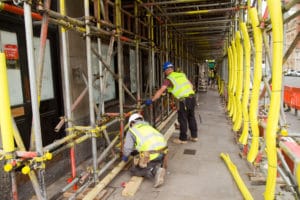
Under the rule change, a “reverse charge” will apply to many VAT-registered businesses in the construction sector. This means that their fellow business customers will pay the VAT on their bills directly to HMRC – rather than to the businesses whose goods and services they have received.
In effect, construction companies could suffer a one-off drop in their cash receipts when the new rules take effect.
Construction Companies v HMRC VAT Rules
When combined with a possible downturn in activity following a potential 31st October Brexit, construction firms could face a significant cash squeeze this autumn. With standard VAT charged at 20 per cent, the sums could be substantial.
Because they will no longer pay the VAT on some sales to HMRC, many affected firms could find that they become “repayment traders”. Their VAT return will be a net claim instead of a net payment to HMRC, with the tax authority owing the firms VAT they have paid on eligible purchases.
Businesses that use invoice discounting facilities to assist their cashflow won’t escape the impact either, as they receive cash advances on the basis of invoice totals including VAT. After October, the VAT element will no longer be included and the amount advanced will reduce, causing cashflow pressure.
Using VAT as Working Capital
VAT is used by many businesses as part of their working capital, so this will hit some construction businesses quite hard. That is why it is important that construction businesses plan ahead for this VAT rule change, starting by understanding how this will affect them.
Preparing a cash flow forecast will help them to assess the impact of the loss of VAT receipts. This should be taken into account, for example, when timing significant discretionary purchases due to be made in the autumn.
Any businesses that are likely to become repayment traders and that currently file quarterly VAT returns could consider applying to move to monthly returns in order to speed up payments due from HMRC. They should also aim to file their returns as soon as possible – again with the aim of speeding up HMRC’s repayments.
Impact on construction businesses
Construction businesses will need to ensure their accounting systems are capable of processing reverse charge supplies and make ongoing checks to ensure that supplies and purchases are correctly treated. As the VAT amount must still be shown on invoices subject to the domestic reverse charge, the risk that suppliers will account for the VAT to HMRC in error and customers will recover it from HMRC is clear.
Subcontractors that rely on VAT collected from their customers as working capital until they have to remit it to HMRC are likely to suffer from the loss of cash flow. These businesses and even their customers will need to consider if payment terms need to be revisited to avoid problems in the supply chain.
Subcontractors will also need to confirm that they are working for a VAT registered business and whether they are working for an end user, or for someone connected to an end user, including landlords and tenants.
The new rules are best illustrated by an example of a VAT registered subcontractor who would, under the current rules, raise an invoice of £1,000 + VAT = £1,200 gross to a main contractor for work on an extension. Under the rules from 1 October 2019:
- The subcontractor will send an invoice for £1,000 to the maincontractor. The invoice will still need to show the VAT which should be paid to HMRC on it even though the subcontractor will not put this VAT on his own VAT return or pay it over to HMRC.
- The main contractor will pay the subcontractor £1,000 (rather than the £1,200 under the current rules)
- The main contractor will add the £200 of VAT that needs to be paid to HMRC on the subcontractor’s sale onto his own VAT return as sales VAT.
- The main contractor can then reclaim the £200 of VAT on his VAT return in the same way as normal.
What supplies are excluded?
The new rules only capture supplies between construction businesses and therefore purchasers of construction services that are not making an onward supply of construction services (for example, they are commissioning the services to build an office) will not be impacted. Additionally, there will be an exclusion for connected businesses. The normal VAT rules will apply where a scenario is excluded from the new rules.
VAT Registration
The reverse charge rules will not apply where the recipient of the construction services is not VAT registered. In these circumstances, VAT must be charged in the normal way. However, the non-VAT registered recipient must add the value of construction services received to the value of its sales, when deciding whether it has exceeded the VAT registration threshold (currently £85,000). This is likely to mean that many small contractors who are not currently VAT registered will need to be registered in future.
Cashflow Funding for Construction Companies
Construction companies in the UK will be directly affected by the change in these VAT rules. One possible solution is to get cashflow funding for a construction business.
Invoice Funding has supported construction companies and sub contractors with cashflow funding for the past ten years. If you are a construction director and welcome a chat how we can support your business and hopefully fund the VAT changes please complete the online enquiry form.
Seasoned professional with a strong passion for the world of business finance. With over twenty years of dedicated experience in the field, my journey into the world of business finance began with a relentless curiosity for understanding the intricate workings of financial systems.
